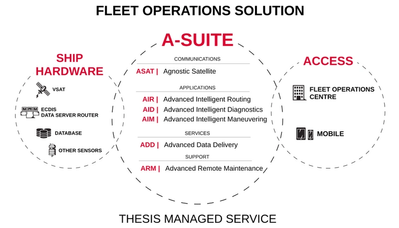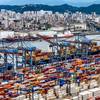Transas has launched its first package of applications built on THESIS, a unified cloud-based platform for managing operations across the full breadth of the maritime ecosystem. The advanced ‘A-Suite’ package also sets a new precedent by utilizing the latest in machine learning techniques to reduce the potential for human errors on the bridge or poor decisions elsewhere in the vessel operational chain.
In addition to the officers and crew working on board ships, the benefits of A-Suite will be available to personnel managing VTS systems and those running shore-based fleet operational centers or even training facilities, allowing them to participate in real-time decision support and post-voyage analysis.
"Technology shouldn't be an end in itself – but a tool to achieve an end,” said Transas CEO Frank Coles. “We want to help the industry improve by enabling it to make better decisions and boost competitive advantage, using machine intelligence to augment the human in the loop.
“We are especially proud to go beyond the hype by bringing to market a set of revolutionary AI-powered e-navigation tools apposite to the needs of modern ships operating in an increasingly automated and digital world.”
The Transas A-Suite employs machine learning techniques to de-risk vessel operation on the bridge, at fleet operation centers and in VTS centers. Algorithms detect anomalies in the behavior of the human operator wherever they are in the operational chain and raise the alarm before the consequences of a course of action or momentary lapse in attention become irreversible.
The first version of the package comprising three core modules – Advanced Intelligent Maneuvering (AIM), Advanced Intelligent Diagnostics (AID), and Advanced Intelligent Routing (AIR) – is now available to end-users and the services will become fully operational over the coming months.
AIM is a track prediction system and anti-collision support tool designed to improve situational awareness and reduce the probability of officer inattention or poor judgment leading to an incident. Using data previously collected on the actions and behavior of personnel sailing in the same location, together with a sophisticated hydrodynamic model of the vessel and a programmatic abstraction of the anti-collision regulations, the system provides advanced decision support.
AID is primarily intended to detect anomalies and provide decision support both in real-time or during a more methodical post-voyage analysis. This module detects excessive or unusual maneuvering patterns, keeping an eye on parameters such as speed and rate of turn, as well as unexpected deviations in fuel consumption. By taking data both from conventional equipment and environmental sensors and recording how and when operators interact with vessel controls, AID marks a major step forward in real time operational monitoring.
AIR creates a platform for voyage planning and optimization based on an extensive set of parameters. The application absorbs real time metocean data, hazards and a vessel’s hydrodynamic performance, as well as taking account of the impact of known and anticipated vessel traffic along the route and at bottlenecks.
These are supported by Advanced Data Delivery (ADD) and Advanced Remote Maintenance (ARM). ADD frees deck officers from the laborious task of updating of special electronic charts (SENCs), weather data, and other navigational safety notices. It also creates an audit trail for shore-based offices ensuring that managers are fully informed of a vessel’s navigational status for compliance purposes. ARM provides remote diagnostics and performance analytics for bridge and satellite communication equipment. It backs up key software together with its configuration data and parameters to the Transas Cloud allowing rapid restoration of service in the event of a system failure.
In addition, A-Suite features a sophisticated e-learning solution, Advanced Remote Training for Seafarers (ARTS), with online access to manufacturer-approved, type-specific training courses for Transas ECDIS. This is fully compliant with SOLAS, ISM, and STCW requirements.
In this way, A-Suite establishes the critical links between vessels and shore-based offices, vessel traffic control centers and training institutions and embodies the core principles of THESIS, Transas’ vision of a harmonized ecosystem, meeting the needs of multiple operational stakeholders simultaneously.
Resilience, security and deep data integration are fundamental to the THESIS concept and, by extension, A-Suite. As a cloud-based technology, the applications can be accessed from ship or shore. However, recognizing the reality that outages in connectivity do happen at sea, the ship-based installation contains an onboard pre-processing data management server, so that the applications and decision support can continue to operate without a live connection to the cloud.
The THESIS network architecture has been designed from the ground up to be secure. Because it encompasses the entire vessel operational ecosystem it was possible to incorporate encrypted channels for all data delivery rather than rely on conventional email for the exchange of potentially sensitive operational data, route plans, chart updates etc. This means, in contrast to existing solutions on the market, A-Suite is not exposed to the vulnerabilities inherent in email.
At the heart of the A-Suite is the same software kernel that powers Transas’ industry leading ECDIS solutions. This gives the applications direct access to all user interactions and the various sensors on the bridge in real time. This level of integration and availability of data allows A-Suite to derive insights that would not be possible with bolt-on standalone third-party solutions.
“When we first started to envisage how ships would be operated in the future, we realized there would be much greater collaboration between ships, back-offices, traffic control centers, etc. With A-Suite we set out to build a set of intelligent decision support tools for working in this shared environment,” explained Coles.
“In contrast to many standalone solutions on the market today, A-Suite pulls together a wider selection of data from a broader range of input sources. Combined with machine learning techniques, this results in a deeper level of insight and guidance that is more reflective of a vessel’s actual situation.”
The three-day Transas Global Conference 2018, which takes place in Vancouver in March, will provide greater insight into and demonstrations of the A-Suite and one day will be dedicated to the examination of the tools and their capabilities in the eco system.













